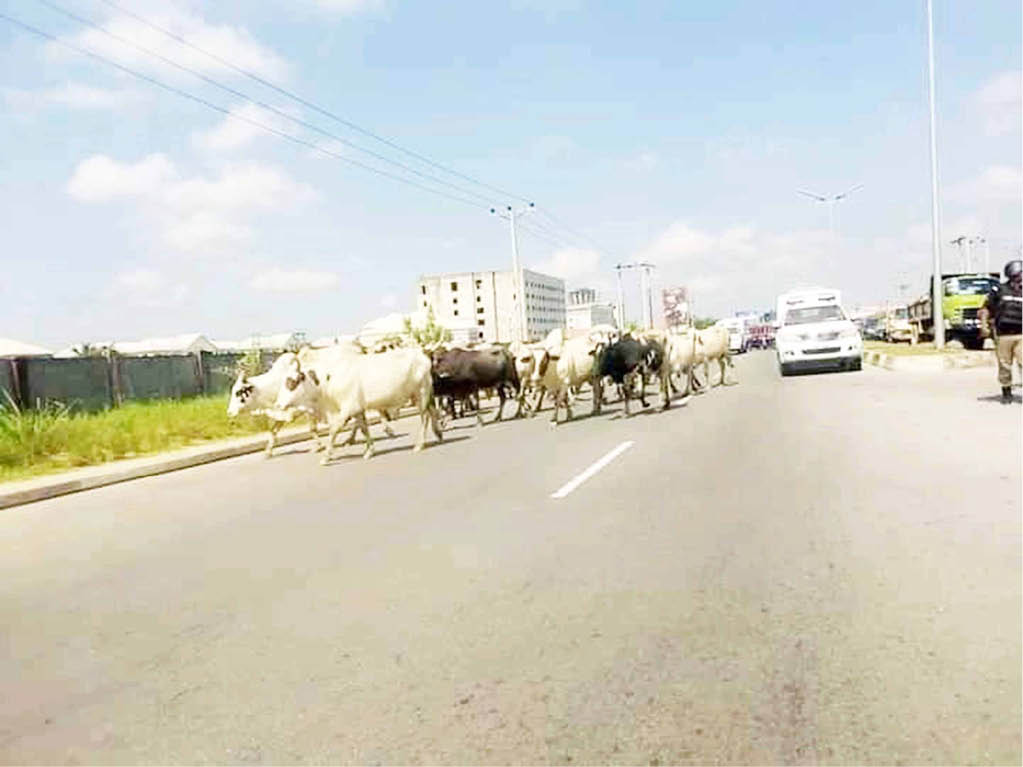Forget about grazing routes recovery
President Muhammadu Buhari has announced plans by his government to recover cattle routes and grazing areas, which had been gazetted since the First Republic, where herders would be redirected to as part of efforts to end farmers/ herders conflicts that have put the country on edge in recent times. Speaking in an interview with Arise […]

Cows along a major road in Yenegoa before the recent ban on open grazing
President Muhammadu Buhari has announced plans by his government to recover cattle routes and grazing areas, which had been gazetted since the First Republic, where herders would be redirected to as part of efforts to end farmers/ herders conflicts that have put the country on edge in recent times.
Speaking in an interview with Arise TV recently in Abuja the president said: “I have asked the attorney-general of the federation to dig up gazettes of the First Republic. There are cattle routes and grazing areas. The routes and the areas are known. You have to stay there and if you allow your cattle to stray into another person’s farm, you will be arrested.
We must emphasise that it does no good to the image of the country that matters are often left to degenerate to a national crisis before rushing to find a remedy. Since 1965, the Government of Northern Nigeria recognised the need to modernise livestock business and consequently came up with a livestock transformation policy. The purpose was not only to improve the quality of beef, introduce new breeds and provide settled life for pastoralists, but also to eliminate herdsmen/farmers clashes. Not much attention was paid to the policy when the First Republic was toppled.
Over the last four and a half decades, the Nigerian population quadrupled, ditto the population of cattle. The conflict over land spreads and increases in intensity, aggravated by cultural and regional sentiments. These conflicts have been left unattended for far too long that it has now snowballed into a deadly national crisis. On the part of the Northern Governors, their response to incessant farmer/herders conflict is inadequate and uncoordinated.
However, we need to stress that livestock business is too important to the economy of the North and the nation to be treated with levity. The business contributes more than three per cent to Nigeria’s GDP, but it is the most neglected. This is unacceptable. There are over 20 million cattle in Nigeria and nearly all of them roam the countryside in what is commonly referred to as open grazing.
During his tenure, former President Goodluck Jonathan approved N100 billion for ranching, as a way to solve the farmers/herders conflict but the fate of that fund remains unknown today as the crisis continues to fester.
The Buhari administration stepped in to address the situation but all the nation has witnessed is policy somersaults. First, it came up with a grazing reserves policy, but it was met with stiff opposition from the south. Then the government opted for Ruga and later changed the name to Livestock Transformation Plan but nothing came out of it.
Under this administration’s Livestock Transformation Policy, the government asked for 5000 hectares from the states and 22 of them have obliged. But three years on, the program is yet to take off in any state. Nothing typifies the confusion in this administration than the current plan to recover cattle routes and grazing reserves, which have been encroached upon when there are 5000 hectares each on offer in 22 states suitable for ranching. As expected, the decision has run into a storm of protests, especially from the south.
It is our view that the government should jettison the idea of the recovery of grazing reserves or cattle routes because it will serve no useful purpose other than increase the tension in the country and waste precious time. The government should instead immediately accept the land offers and provide the resources and technical assistance for the take-off of the ranches. In any case, research has shown that beef and milk produced by cattle kept in ranches are of higher quality than those produced by roaming cattle. It is time to adopt the modern way of rearing these animals.
There is no better time than now for the federal government to take a bold step to address the farmers/herders conflict that has claimed several lives. A stitch in time saves nine.
